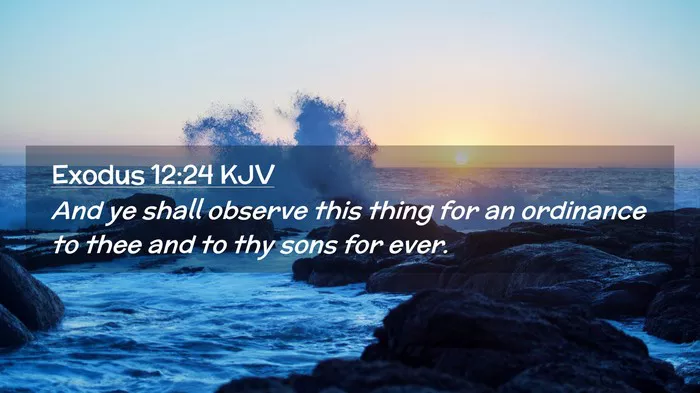Read the Daily Bible Verse – Exodus 12:24 To Strengthen Your Spiritual Journey.
Exodus 12:24 stands as a vital instruction within the Passover narrative, emphasizing the perpetual importance of God‘s commandments for His people. It conveys a call to remember, observe, and pass down divine ordinances across generations. This article delves into the verse’s context, its meaning, applications, and its enduring significance, providing a comprehensive understanding of this pivotal scripture.
The Context on Exodus 12:24 KJV
The verse reads: “And ye shall observe this thing for an ordinance to thee and to thy sons for ever.” (Exodus 12:24, KJV)
Historical Background
The Israelites were on the verge of deliverance from centuries of slavery in Egypt. God instructed Moses and Aaron to prepare the Israelites for the final plague, the death of the firstborn. The Passover was instituted as a way to protect the Israelites and ensure their liberation. Central to this observance was the sacrifice of a lamb and the application of its blood on the doorposts, signifying faith and obedience to God’s command.
The Significance of Divine Ordinances
Exodus 12:24 emphasizes the enduring nature of the Passover as an ordinance to be observed perpetually. This command ensured that future generations would remember God’s deliverance, fostering a culture of faithfulness and gratitude.
The Role of Family
The inclusion of “to thy sons for ever” highlights the responsibility of passing down faith and spiritual traditions within families. The context underscores the communal and generational nature of worship and remembrance.
The Exodus 12:24 Meaning
“And ye shall observe this thing”
The phrase calls for active participation and adherence to God’s command. Observing implies more than mere acknowledgment; it involves deliberate action, reflection, and obedience.
“For an ordinance”
An ordinance is a formal decree or practice established by authority. In this context, it signifies a divinely instituted practice intended to remind the Israelites of God’s deliverance and covenantal relationship.
“To thee and to thy sons for ever”
This clause extends the command beyond the immediate audience, making it a perpetual responsibility for future generations. It emphasizes the continuity of faith and the importance of remembrance.
Exodus 12:24 Application in Life
1. Honoring God’s Commands
Exodus 12:24 reminds believers of the importance of obedience to God’s Word. Just as the Israelites were called to observe the Passover, Christians are called to honor God through their actions and faith.
2. Passing Down Faith
The verse highlights the responsibility of parents and spiritual leaders to teach their children about God’s works. Families are encouraged to create traditions that reflect and reinforce their faith.
3. Cultivating Gratitude
The Passover observance served as a reminder of God’s deliverance. In modern life, believers can cultivate gratitude by remembering God’s faithfulness and blessings.
4. Commitment to Worship
The call to observe the Passover perpetually encourages believers to remain steadfast in worship. It inspires a commitment to honor God through regular spiritual practices.
Comparison with Other Biblical Texts
1. Deuteronomy 6:6-9
This passage instructs the Israelites to teach God’s commandments diligently to their children. It aligns with Exodus 12:24 in emphasizing the generational transmission of faith and obedience.
2. Joshua 4:6-7
Joshua commands the Israelites to set up memorial stones as a sign of God’s deliverance. Like the Passover ordinance, these stones served as a tangible reminder for future generations of God’s power and faithfulness.
3. Psalm 78:4-7
This psalm encourages the recounting of God’s deeds to children, fostering a legacy of trust and obedience. It echoes the call in Exodus 12:24 to observe and remember God’s works.
4. Luke 22:19
In instituting the Lord’s Supper, Jesus tells His disciples to “do this in remembrance of me.” This parallels the perpetual observance of the Passover, as both practices commemorate God’s redemptive acts.
5. 1 Corinthians 11:26
Paul emphasizes that partaking in the Lord’s Supper proclaims Christ’s death until He returns. This reinforces the concept of remembrance and continuity seen in Exodus 12:24.
Modern-Day Relevance
1. Observing Spiritual Practices
Exodus 12:24 reminds believers of the importance of maintaining spiritual disciplines and observances. Whether through corporate worship, personal prayer, or sacraments, believers are called to honor God consistently.
2. Teaching Future Generations
The verse underscores the need to actively pass down faith to the next generation. In a modern context, this could involve teaching children biblical principles, engaging in family devotions, or involving them in church activities.
3. Celebrating Deliverance
While Christians may not celebrate the Passover, they celebrate deliverance through Christ. Holidays like Easter and practices like communion serve as reminders of God’s redemptive work.
4. Preserving Faith in a Changing World
In a world that often devalues tradition, Exodus 12:24 encourages believers to uphold and cherish spiritual practices that reinforce their faith and identity.
Conclusion
Exodus 12:24 is a profound reminder of the importance of remembrance, obedience, and generational faithfulness. It calls believers to honor God’s commands, pass down their faith, and cultivate a legacy of worship and gratitude.
By observing God’s ordinances and teaching them to future generations, Christians can maintain a vibrant and enduring faith. In a world that often challenges traditional values, this verse inspires believers to remain steadfast, ensuring that God’s works and promises are never forgotten.
Exodus 12:24 Commentary
Commentators highlight several key aspects of this verse:
Perpetual Observance: Scholars emphasize that the command reflects the timeless nature of God’s acts and the importance of remembering His faithfulness. The Passover was not merely for the generation that experienced the exodus but for all subsequent generations.
Generational Responsibility: The mention of “sons” indicates the communal and familial aspect of faith. Commentators note the role of parents as spiritual stewards, entrusted with teaching their children about God.
Typology of Christ: Many theologians see the Passover as a foreshadowing of Christ’s sacrifice. The call to observe the Passover eternally points to the eternal significance of Christ’s redemptive work.
Holistic Worship: The verse implies that worship involves remembrance, teaching, and action. It challenges believers to integrate these elements into their faith practice.
Related Topics:


